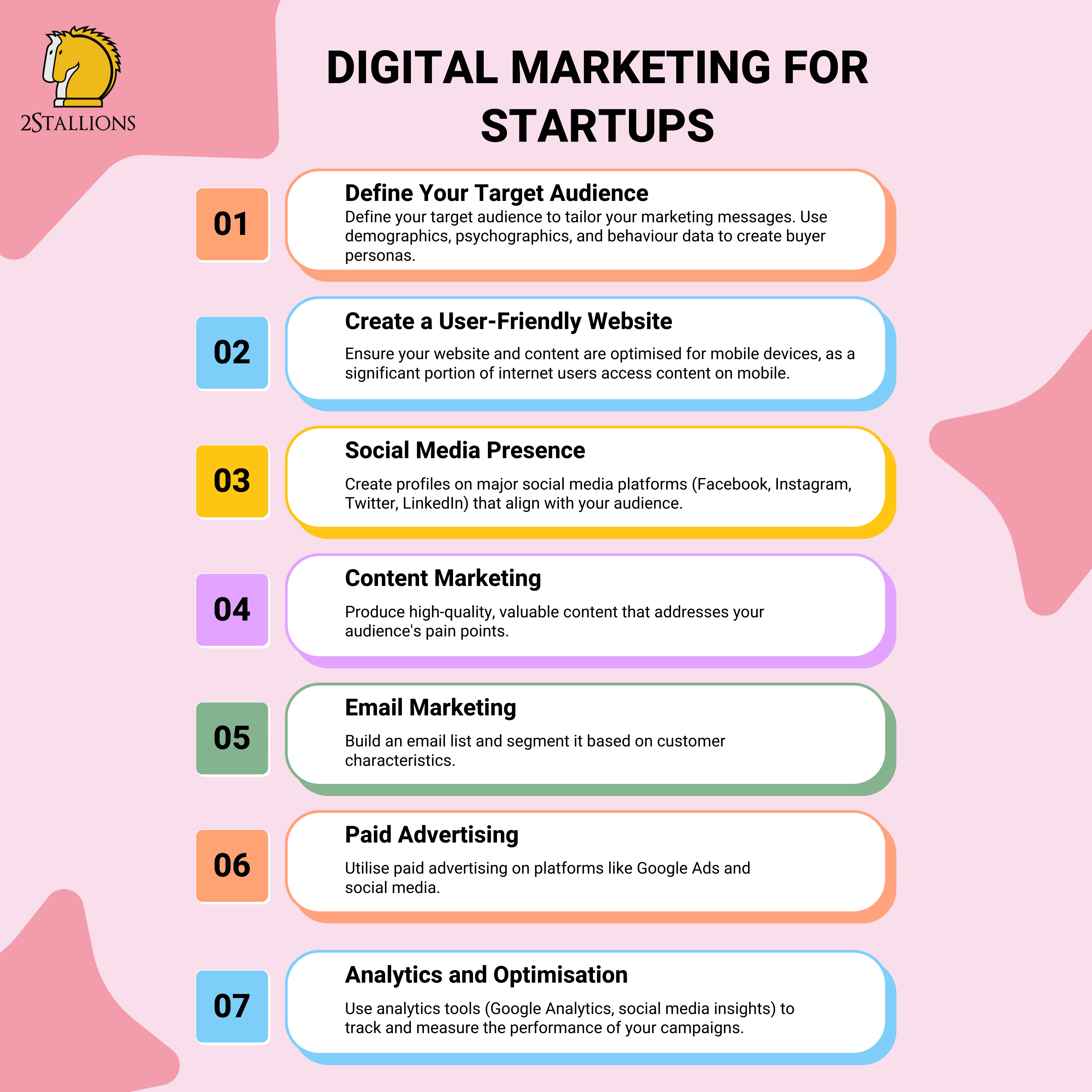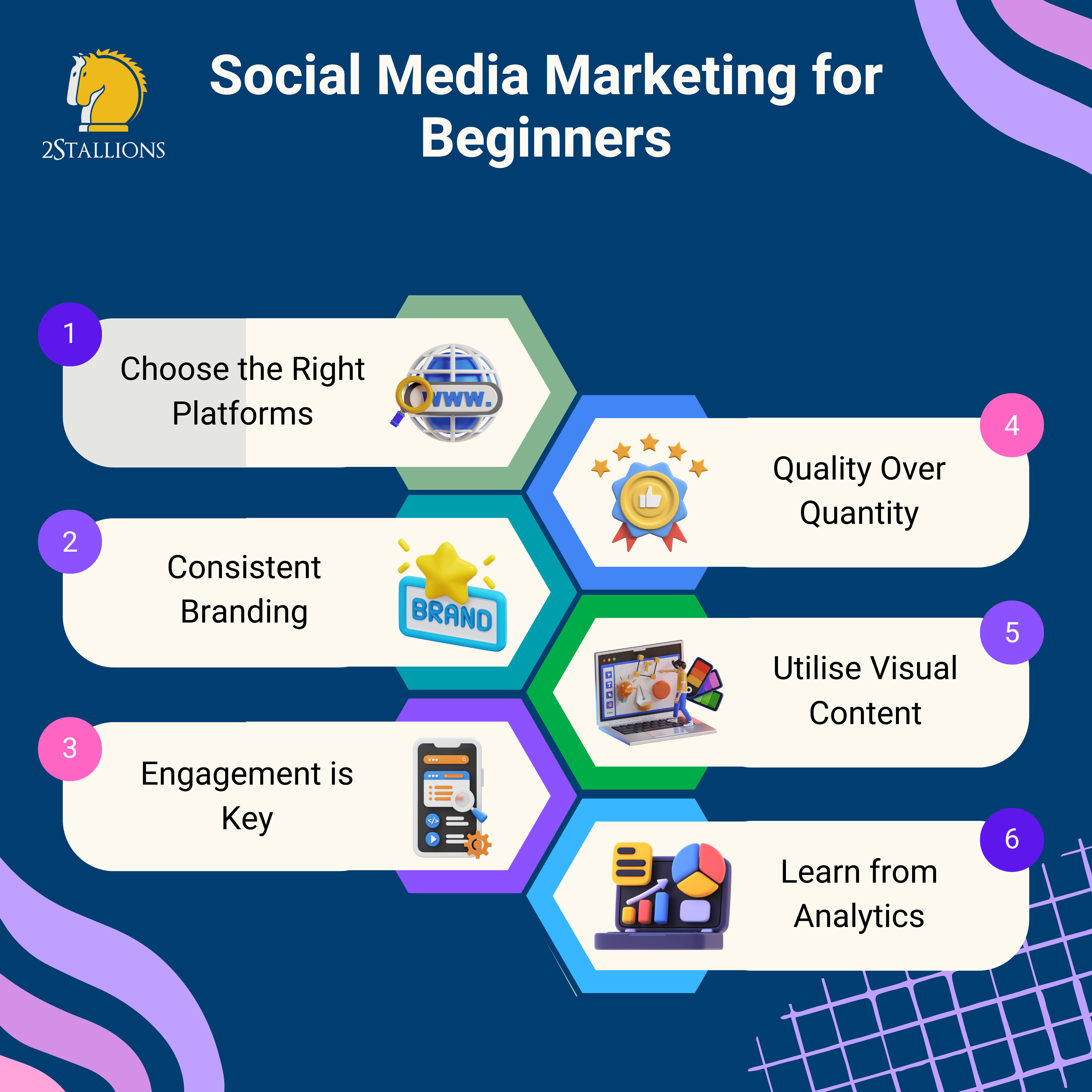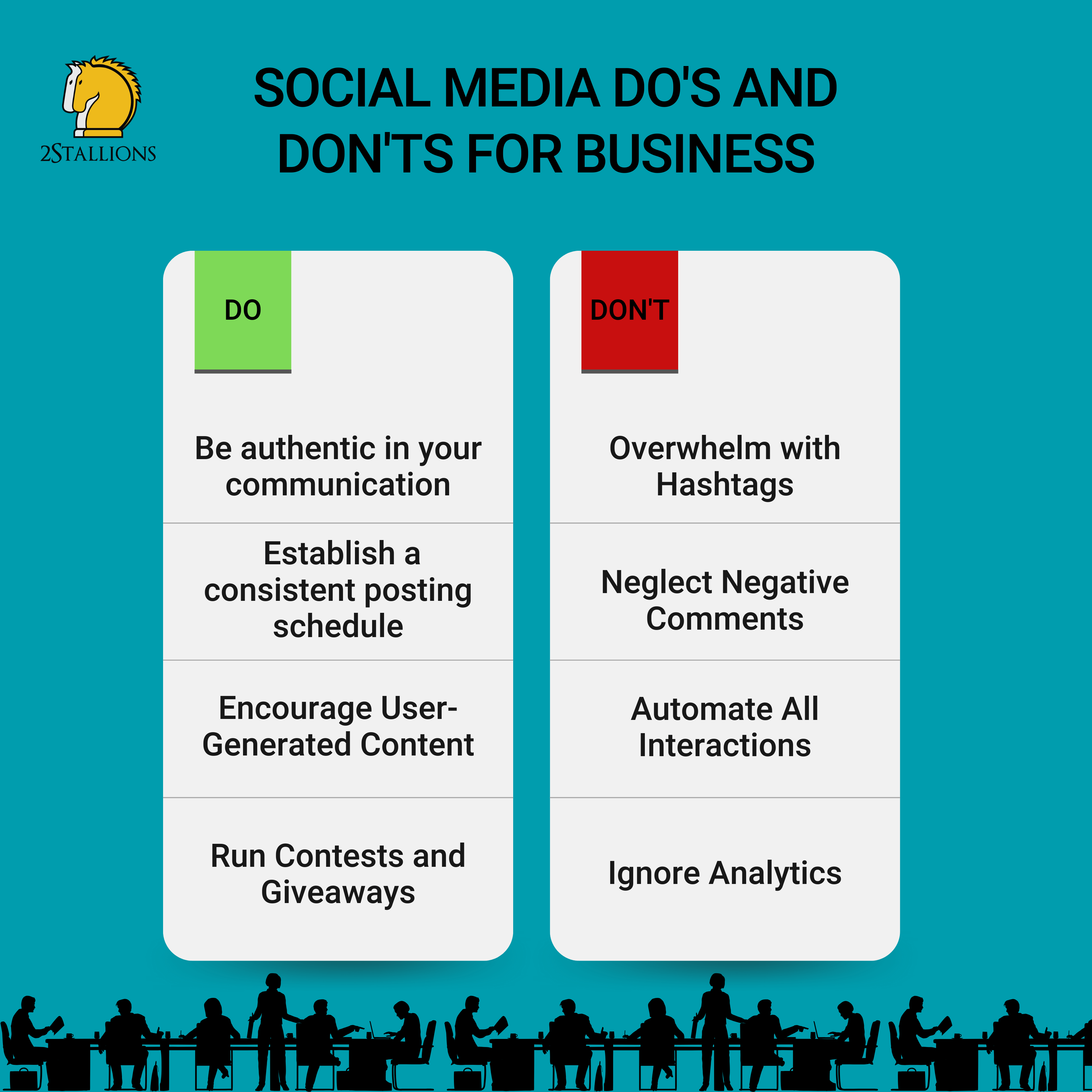SHARE

In the world of modern business, the impact of social media cannot be overstated. As businesses strive to connect with their audience, foster brand loyalty, and navigate the ever-evolving digital realm, mastering the art of social media marketing has become advantageous and essential.
Digital Marketing for Startups
A robust online presence is imperative for startups’ success in the contemporary business landscape. This is where digital marketing for startups plays a pivotal role. Unlike traditional marketing, digital marketing leverages various online channels and platforms to reach a wider audience, build brand awareness, and drive business growth.
[thrive_leads id=’8334′]
Here are key strategies for startups venturing into digital marketing:
Define Your Target Audience:
Understanding your target audience is fundamental to crafting effective digital marketing strategies. Identify their demographics, preferences, and online behaviour to tailor your approach.
Create a User-Friendly Website:
Your website is often customers’ first interaction with your brand. To enhance visibility, ensure it is visually appealing, easy to navigate, and optimised for search engines (SEO).
Social Media Presence:
Establishing a solid presence on social media platforms is essential. Choose the platforms that align with your target audience and industry. Share engaging content regularly, interact with your audience, and use social media advertising to boost visibility.
Content Marketing:
Content is a powerful tool for attracting and retaining customers. Develop valuable and relevant content that addresses your audience’s needs. This can include blog posts, videos, infographics, and more.
Email Marketing:
Build and maintain a mailing list to connect with your audience directly. Email marketing lets you share updates, promotions, and valuable content directly with your subscribers.
Paid Advertising:
Utilise paid advertising on platforms like Google Ads and social media to reach a broader audience quickly. Develop targeted campaigns to maximise the impact of your advertising budget.
Analytics and Optimisation:
Regularly monitor the performance of your digital marketing efforts using analytics tools. Analyse key metrics such as website traffic, conversion rates, and engagement to refine and optimise your strategies.
Looking for a results-driven social media marketing agency? 2Stallions creates impactful campaigns that boost your brand awareness and foster meaningful audience engagement. Schedule a free consultation with us now.
Social Media Marketing for Beginners
Social media marketing can be exciting and challenging for beginners to do online marketing. It offers direct communication with your audience, making them valuable tools for brand building and customer engagement.
Here are essential tips for beginners diving into social media marketing:
Choose the Right Platforms:
Identify the social media platforms most relevant to your target audience. Each platform has a unique user base and features, so tailor your social media strategies accordingly.
Consistent Branding:
Maintain a consistent brand image across all social media channels. This includes your logo, colour scheme, and messaging. Consistency builds brand recognition.
Engagement is Key:
Social media is not a one-way street. Actively engage with your audience by responding to comments, asking questions, and participating in relevant conversations. This builds a sense of community around your brand.
Quality Over Quantity:
Focus on creating high-quality content rather than overwhelming your audience with frequent but mediocre posts. Share content that adds value and resonates with your audience.
Utilise Visual Content:
Visual content, such as images and videos, performs well on social media. Invest time in creating visually appealing and shareable content to capture your audience’s attention.
Learn from Analytics:
Most social media platforms offer analytics tools. Pay attention to these metrics to understand what content resonates with your audience. Use the insights gained to refine your strategy.
Social Media Do’s and Don’ts for Business
Effective social media management is pivotal for businesses aiming to connect with their audience, build brand loyalty, and drive growth. Here are more detailed do’s and don’ts to guide your social media strategy:
Do’s:
- Authenticity is Key: Be authentic in your communication. Share behind-the-scenes glimpses, stories, and authentic experiences to humanise your brand. Authenticity builds trust and resonates with audiences.
- Implement a Posting Schedule: Establish a consistent posting schedule. Regular and timely content keeps your audience engaged and helps maintain a steady presence in their feeds.
- Encourage User-Generated Content: Encourage your audience to create and share content related to your brand. User-generated content serves as authentic endorsements and fosters a sense of community.
- Run Contests and Giveaways: Run contests and giveaways to boost engagement and reach. This can attract new followers and create excitement around your brand.
- Stay Informed About Trends: Stay updated on social media trends and incorporate relevant ones into your strategy. Awareness of popular hashtags, challenges, or features keeps your content current.
Don’ts:
- Overwhelming with Hashtags: While hashtags can increase discoverability, too many can make your content appear spammy. Focus on using relevant and targeted hashtags.
- Neglect Negative Comments: Address concerns professionally and seek to resolve issues. Transparent and constructive responses demonstrate your commitment to customer satisfaction.
- Automate All Interactions: While scheduling posts is efficient, avoid automating all interactions. Authentic engagement requires genuine, human responses.
- Ignore Analytics: Regularly analyse your performance metrics to understand what works and adjust your strategy accordingly.
- Post Inconsistently: Inconsistency can lead to declining engagement and visibility. Stick to your posting schedule to maintain a reliable presence.
- Compromise Brand Values: Compromise your brand values for engagement. Stay true to your brand’s mission and values, even if it means taking a stand on certain issues.
Business Without Social Media
In an era dominated by digital communication, the decision to run a business without a social media presence is a strategic choice that requires careful consideration. While it’s technically possible, there are advantages and disadvantages to opting out of social media for business.
Advantages:
Focus on Core Operations: Without the demands of maintaining a social media presence, businesses can redirect resources and energy toward core operations, product development, and customer service.
Example:
A small family-owned bakery operating in a close-knit community decides to forego social media. Instead, they channel their resources into perfecting their recipes, expanding their in-store experience, and fostering strong ties with local customers.
Privacy and Control: Operating without social media reduces the risk of privacy concerns and control over brand messaging. Businesses have more control over how their brand is perceived without the unpredictability of social media interactions.
Example:
A boutique law firm handling sensitive legal matters opts out of social media to maintain a higher level of confidentiality. They prioritise direct communication with clients and control the dissemination of information through more traditional means.
Cost Savings: Social media marketing can incur costs in terms of time and resources. Businesses can avoid these expenses and allocate resources elsewhere by abstaining from social media.
Example:
A startup with limited resources avoids social media marketing during its initial stages. Instead, they focus on cost-effective local advertising, word-of-mouth referrals, and building a solid foundation before venturing into the digital realm.
Disadvantages:
Limited Reach and Exposure: Social media is a powerful tool for brand exposure, reaching a vast audience quickly. With it, businesses can expand their reach beyond traditional marketing methods.
Example:
An artisanal craft shop that relies solely on foot traffic may need help to reach a broader audience. While their unique products captivate local customers, they miss out on the opportunity to showcase their creations to a global market without a social media presence.
Missed Customer Interactions: Social media provides a platform for direct customer interaction. Without it, businesses may miss valuable customer feedback, inquiries, and the opportunity to build a loyal online community.
Example:
A boutique clothing store without a social media presence may miss valuable opportunities to engage with customers. They may receive delayed feedback on new arrivals or be able to address customer inquiries in real-time, potentially impacting customer satisfaction.
Competitive Disadvantage: Many competitors leverage social media to gain a competitive edge. Businesses without a social media presence may struggle to keep up with industry trends, stay visible, and compete effectively.
Example:
In a competitive tech industry, a startup chooses not to establish a social media presence. Meanwhile, their competitors actively engage with online communities, share industry insights, and attract a wider audience. This lack of visibility may result in the company staying caught up in industry trends and customer acquisition.
Elevate Your Brand’s Reach With Expert Social Media Advertising Agency. Explore our SMM services and unlock your digital potential today! Partner with us for impactful campaigns. Boost your online presence with our proven techniques and start connecting with your audience like never before.
Originally published: 24 February 2023
Updated: 27 November 2023
Frequently Asked Questions about Social Media Marketing
How Can I Make Social Media Marketing Easy?
Making social media marketing easy involves breaking down the process into manageable steps:
- Define Clear Objectives: Clearly outline your social media marketing goals. Whether increasing brand awareness, driving website traffic, or boosting sales, having a clear objective guides your strategy.
- Choose the Right Platforms: Identify the social media platforms where your target audience is most active. Focus your efforts on platforms that align with your business and marketing goals.
- Consistent Branding: Maintain a consistent brand identity across all platforms. This includes your logo, colour scheme, and messaging. Consistency builds recognition and trust.
- Create a Content Calendar: Plan your content in advance using a content calendar. This ensures a steady flow of content and helps you stay organised and consistent.
- Engage with Your Audience: Actively engage with your audience by responding to comments, messages, and mentions. Encourage conversations and build a community around your brand.
- Analytics and Iteration: Use analytics tools to track the performance of your social media efforts. Analyse engagement, reach, and conversion rates to refine your strategy.
How Do Beginners Start Social Media Marketing?
Beginners can start social media marketing with the following steps:
- Choose the Right Platforms: Identify the social media platforms that align with your target audience and business goals. To avoid feeling overwhelmed, start with one or two platforms.
- Create a Complete Profile: Optimise your social media profiles by providing a clear and compelling business description. Use high-quality visuals such as a logo or professional photos.
- Understand Your Audience: Research your target audience’s preferences, behaviours, and interests. Tailor your content to resonate with them.
- Create Valuable Content: Develop content that enhances your audience’s experience. This could include informative posts, entertaining visuals, or exclusive promotions.
- Engage and Network: Actively engage with your audience and network with others in your industry. Respond to comments, participate in relevant discussions, and build relationships.
- Learn from Analytics: Use the analytics tools provided by each platform to understand what is working and what isn’t. Then, based on those insights, adjust your strategy.
How Do I Teach Myself Social Media Marketing?
Teaching yourself social media marketing involves a self-directed learning approach:
- Online Courses and Resources: Take advantage of online courses and resources on platforms like Coursera, Udemy, and HubSpot. These courses cover various aspects of social media marketing.
- Follow Industry Experts: Follow social media marketing experts and influencers on platforms like LinkedIn and Twitter. Learn from their insights, tips, and experiences.
- Practice with Personal Accounts: Experiment with social media strategies on your accounts. This hands-on experience allows you to apply your knowledge and see the results firsthand.
- Read Books and Blogs: Read books and blogs for social media marketing. This provides in-depth knowledge and diverse perspectives on the subject.
- Attend Webinars and Workshops: Participate in webinars and workshops to stay updated on the latest trends and best practices in social media marketing.
- Build a Portfolio: Create a portfolio showcasing your social media marketing skills. Include examples of successful campaigns, content creation, and analytics interpretation.
How Can I Learn Social Media Marketing Fast?
Learning social media marketing quickly requires focused and efficient strategies:
- Intensive Courses: Enrol in intensive, focused courses that provide comprehensive social media marketing coverage in a short period. Look for courses that offer hands-on exercises and real-world applications.
- Mentorship or Coaching: Seek mentorship or coaching from experienced professionals. Personalised guidance can accelerate your learning curve.
- Focus on Core Concepts: Identify and prioritise core concepts in social media marketing. Focus on understanding the fundamentals before diving into advanced topics.
- Practical Application: Apply your learning immediately by working on real-world projects. Practical application reinforces theoretical knowledge and accelerates skill development.
- Stay Updated: Stay informed about the latest trends and updates in social media marketing. Follow industry news, subscribe to newsletters, and actively engage in online communities.
- Networking Opportunities: Network with professionals in the field to gain insights and learn from their experiences. Attend events and webinars, or join online forums to expand your network.

















